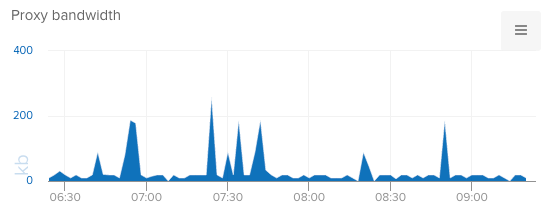Metrix
========
An Elixir library to log custom application metrics (for use by other downstream systems such as [Librato](https://www.librato.com/), [Riemann](http://riemann.io/) etc...)
Metrix subscribes to the Twelve Factor App notion that [logs are streams of time-ordered events](http://12factor.net/logs) and that events should be captured and recorded in the [l2met logging convention](https://github.com/ryandotsmith/l2met/wiki/Usage#logging-convention).
What this means in pragmatic terms is that this library provides a few convenience methods to help you capture data from your application to `stdout` in a well-structured key-value format:
```
measure#api.request.service=23.43ms path=/v1/user.json response_status=200
sample#api.response.size=1.34kb path=/v1/user.json
count#user.login user_id=32 other="data with spaces"
```
Note: Metrix does *not* do any calculations itself. It merely logs the data its given in a specific format. If you are looking for an in-app instrumentation library, you may want to look at [exometer](https://github.com/Feuerlabs/exometer) or [folsom](https://github.com/boundary/folsom) instead.
## Benefits
Treating "logs as data" in this manner has several advantages, including:
* Logs are machine parseable *and* human readable, providing the best of both worlds
* It's a low-overhead way of getting data out of your app, not requiring any additional in-app processing or dependencies
* The ability to pipe app data to one or more downstream processors, such as Librato for visualization and Reimann for alerting, without requiring modification to the app
* Data is output via `stdout` and can be manipulated with a multitude of POSIX utilities
If you are looking for a more substantive justification for this style of logging, please see [5 Steps to Better Application Logging](http://www.miyagijournal.com/articles/five-steps-application-logging/).
## Install
Add `metrix` to your applications in `mix.exs`:
```elixir
def application do
[mod: {YourApp, []},
applications: [..., :metrix]]
end
```
And declare it as a dependency:
```elixir
defp deps do
[
# ...
{:metrix, "~> 0.1.0"}
]
end
```
Then update your dependencies:
```session
$ mix deps.get
```
## Usage
There are three types of metrics natively supported by Metrixs, `count`s, `sample`s and `measure`ments.
### Count
When you want to count the occurrences of an event in your app, use `count`:
```elixir
import Metrix
count "app.event"
count "app.event", 3
```
Which will output:
```session
count#event.name=1
count#event.name=3
```
Event metadata can be attached by passing in a map as the first argument:
```elixir
%{"path" => "/users/1"} |> count "app.event"
```
Which outputs:
```session
count#event.name=1 path=/users/1
```
`metadata` can be a map or keyword list:
```elixir
[path: "/users/1"] |> count "app.event"
```
When passed to log processors like Librato, counts can be min, max, summed, stacked etc...

### Sample
Samples are used to take periodic, point-in-time, measurements such as CPU load, hard disk space etc...
Samples are logged in the same fashion as `count`:
```elixir
import Metrix
sample "file.size", "12.3kb"
[file: "/images/hi.png"] |> sample "file.size", "12.3kb"
```
Which will output:
```session
sample#file.size=12.3kb
sample#file.size=12.3kb file=/images/hi.png
```
Samples are captured in Librato with the units used in the measurement value (`kb` in this case) and can be averaged, p50, p95, and p99d.

### Measure
Measurements are measures of time, most often used to track execution time. As such, they wrap a block of code whose execution time is to be measured:
```elixir
import Metrix
measure "api.request", fn -> HTTPotion.get "httpbin.org/get" end
[path: "/get"]
|> measure "api.request", fn -> HTTPotion.get "httpbin.org/get" end
```
Measurements are taken in `ms`:
```session
measure#api.request=142ms
measure#api.request=131ms path=/get
```
It's common to want to add metadata to a measurement that is used within the function call (the `path` above being a good example). Instead of providing a no-arg function to `measure`, you can provide a 1-arity function that accepts the metrics metadata (and can pattern match against it). For instance:
```elixir
%{"path" => "/get", "client" => "elixir"}
|> measure "api.request", fn(%{"path" => path}) -> HTTPotion.get "httpbin.org#{path}" end
```
```session
measure#api.request=131ms path=/get client=elixir
```
Measurements in Librato are collected into median, p95 and p99 series:

### Global context
Often times there is metadata you want applied to every measurement. For instance a `source` element indicating which server the output originated from or `app` which differentiates output from multiple components going to the same downstream processor. This type of universally applicable metadata can be set once using the global context:
```elixir
Metrix.add_context %{"source" => System.get_env("NODE_NAME")}
Metrix.count "event.name"
```
```
count#event.name=1 source=node.us-east.1a
```
The context can be cleared with `Metrix.clear_context`, though be aware it is global context and will be cleared for all output.
## Heroku & Librato
Librato is my preferred choice for metrics visualization and long-term storage. It also plays very well with apps deployed to Heroku. Follow these instructions to get your Heroku app's Metrix log output streaming to Librato for processing.
### Librato add-on
If your app is deployed to Heroku, just add the Librato add-on and all [custom counts, samples and measurements](https://devcenter.heroku.com/articles/librato#custom-log-based-metrics) will automatically be sent to Librato which will apply median, p95, p99 and a host of other real-time aggregations. In addition, Heroku's native logging will also be piped to Librato, giving you both platform and app metrics in one place.
### External Librato account
If you already have a Librato account, you can still stream your data to from Heroku by setting up a [custom log drain](http://support.metrics.librato.com/knowledgebase/articles/265391-heroku-native-and-custom-metrics-without-the-libra).
## Todo
There are a few known missing pieces, including:
* Multiple metrics per log line
* Scoped contexts (e.g., request ids)
* Logger/log level integration
* k/v pair ordering
## Acknowledgements
This library was built as an Elixir alternative to the Ruby-based [Scrolls](https://github.com/asenchi/scrolls) library, which I've found to be indispensable. It was also built on top of [Logfmt](https://github.com/jclem/logfmt-elixir), which handles the mundane but critical task of actually formatting the output as correctly escaped key/value pairs.
